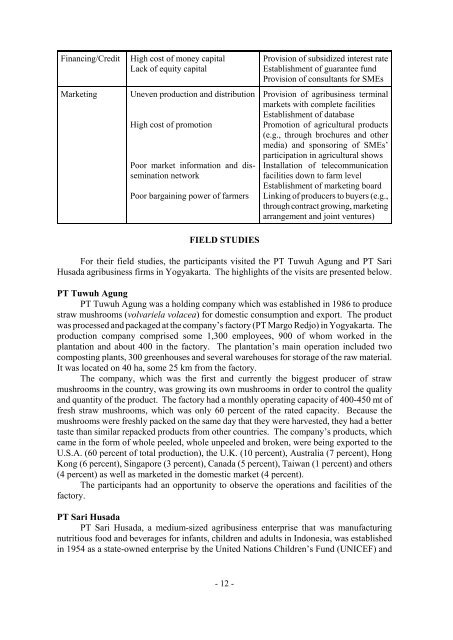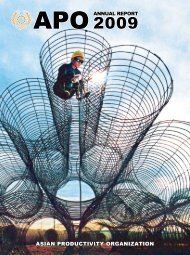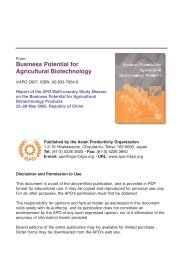Development of Agribusiness Enterprises - Asian Productivity ...
Development of Agribusiness Enterprises - Asian Productivity ...
Development of Agribusiness Enterprises - Asian Productivity ...
Create successful ePaper yourself
Turn your PDF publications into a flip-book with our unique Google optimized e-Paper software.
Financing/Credit High cost <strong>of</strong> money capital<br />
Lack <strong>of</strong> equity capital<br />
Marketing Uneven production and distribution<br />
High cost <strong>of</strong> promotion<br />
Poor market information and dissemination<br />
network<br />
Poor bargaining power <strong>of</strong> farmers<br />
FIELD STUDIES<br />
- 12 -<br />
Provision <strong>of</strong> subsidized interest rate<br />
Establishment <strong>of</strong> guarantee fund<br />
Provision <strong>of</strong> consultants for SMEs<br />
Provision <strong>of</strong> agribusiness terminal<br />
markets with complete facilities<br />
Establishment <strong>of</strong> database<br />
Promotion <strong>of</strong> agricultural products<br />
(e.g., through brochures and other<br />
media) and sponsoring <strong>of</strong> SMEs’<br />
participation in agricultural shows<br />
Installation <strong>of</strong> telecommunication<br />
facilities down to farm level<br />
Establishment <strong>of</strong> marketing board<br />
Linking <strong>of</strong> producers to buyers (e.g.,<br />
through contract growing, marketing<br />
arrangement and joint ventures)<br />
For their field studies, the participants visited the PT Tuwuh Agung and PT Sari<br />
Husada agribusiness firms in Yogyakarta. The highlights <strong>of</strong> the visits are presented below.<br />
PT Tuwuh Agung<br />
PT Tuwuh Agung was a holding company which was established in 1986 to produce<br />
straw mushrooms (volvariela volacea) for domestic consumption and export. The product<br />
was processed and packaged at the company’s factory (PT Margo Redjo) in Yogyakarta. The<br />
production company comprised some 1,300 employees, 900 <strong>of</strong> whom worked in the<br />
plantation and about 400 in the factory. The plantation’s main operation included two<br />
composting plants, 300 greenhouses and several warehouses for storage <strong>of</strong> the raw material.<br />
It was located on 40 ha, some 25 km from the factory.<br />
The company, which was the first and currently the biggest producer <strong>of</strong> straw<br />
mushrooms in the country, was growing its own mushrooms in order to control the quality<br />
and quantity <strong>of</strong> the product. The factory had a monthly operating capacity <strong>of</strong> 400-450 mt <strong>of</strong><br />
fresh straw mushrooms, which was only 60 percent <strong>of</strong> the rated capacity. Because the<br />
mushrooms were freshly packed on the same day that they were harvested, they had a better<br />
taste than similar repacked products from other countries. The company’s products, which<br />
came in the form <strong>of</strong> whole peeled, whole unpeeled and broken, were being exported to the<br />
U.S.A. (60 percent <strong>of</strong> total production), the U.K. (10 percent), Australia (7 percent), Hong<br />
Kong (6 percent), Singapore (3 percent), Canada (5 percent), Taiwan (1 percent) and others<br />
(4 percent) as well as marketed in the domestic market (4 percent).<br />
The participants had an opportunity to observe the operations and facilities <strong>of</strong> the<br />
factory.<br />
PT Sari Husada<br />
PT Sari Husada, a medium-sized agribusiness enterprise that was manufacturing<br />
nutritious food and beverages for infants, children and adults in Indonesia, was established<br />
in 1954 as a state-owned enterprise by the United Nations Children’s Fund (UNICEF) and
















